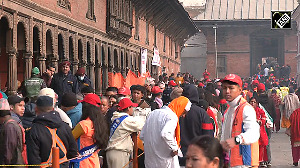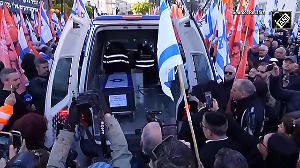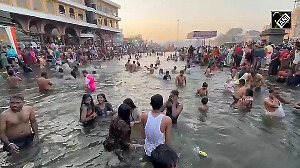
1815 IST, September 11, 2001. 6:30 to 7 pm was break time. I had been preparing for the Test of English as a Foreign Language and the Graduate Record Examination for three weeks now.
The exams were later next month and the pressure to do well intense. If I failed to get a good score, my parents would have me married, squashing my dreams of higher education in the US.
Music was my only saviour right then. But not having a music system at home made me turn to the television.
An image caught my attention: clouds of smoke billowing from two deceptively familiar towers from Friends. Was it? No! Oh my God! No!
I switched to CNN. The World Trade Centre was no more. Terrorists had attacked America. The invincible, powerful, glorious land of opportunities had woken to a black Tuesday.
It was sheer panic on every news channel. And it seeped into me. Thousands of miles from Ground Zero, I could feel the tension, the tears, the agony, the shock. Sirens blowing -- that was the only sound.
Statistics began pouring in a while later and one could see the Indian broadcast media focusing on the number of desis trapped in the debris. Names and numbers from agencies that employed Indians in the twin towers were being splashed across. Several discussion panels were being hurriedly arranged. The talks were centred not so much on what had happened, but its aftermath.
Everyone was awake. I remember not having dinner that night. The sombreness of the event had touched everybody.
For me, it was a state of anxiousness. Here I was, up all nights practicing American English, quantitative reasoning and verbal analogies, and there America was burning. A hundred possibilities raced through my mind. Perhaps I could just continue freelancing for magazines. Or do a course in India somewhere. Maybe I could just listen to my parents for once, and get 'settled'
To take my mind off the chaos being broadcast, I logged on to the Internet. It wasn't any different there.
Online, the emphasis was on 'I am safe Amma and Appa' messages. The STAR news message board was inundated with frantic one-liners from the kin of those studying or settled in the US. Rediff.com had put up a special chat room to facilitate such messages. MSNBC was broadcasting live coverage of events in downtown Manhattan, especially for its Indian audiences.
I distinctly remember CNN's web site being down that night. They had put up the bare minimum they could on their homepage. That was their way of coping with the whopping traffic the site was receiving.
The Net only added to my panic. What was I to do? Would my parents agree on sending me to the US after this? Would the American embassy shut down? Would I even get a visa? Would there be terror strikes in India now? Would I be killed just like all those people who rammed into the towers?
Questions -- so many of them! Answers none.
It was only after I got an email from someone in Vadodra, Gujarat that I began thinking what the tragedy meant for others. The email requested me to forward the message to as many people in the US I knew, and bid them to do the same, in an effort to reach a relative in New York who was not answering his phone or responding to emails. This was a human connection. It was not so much about the politics or the economics of the world in frenzy it was about people.
I felt rather small that moment. Thousands of people had lost someone close to them in a tragedy the modern world had never witnessed before. The barbarism was unparalleled and here I was thinking how it would affect my plans.
This selfishness was extended to the way the local media was working too. Although the news was 'America's nightmare' the stories were about 'India's concerns'.
For America this was all so new. For Indians facing terrorism for a long time, it was just one of those really bad days. Not that the media did not sympathise. Not that the common man did not care. But we had our own issues. What implications would this attack have on Indo-American relations? Would there be increased cross-border firing? How would Pakistan react? Would America drop bombs on Afghanistan now? Would there be a Third World War? These were just some of the questions popping up.
A national daily ran a report next morning. It said reserve battalions in Jammu and Kashmir have been deployed and the borders with Pakistan and Bangladesh and those in peninsular India were on high alert following the attack on the US. The headline of the piece was 'Terror strikes India'.
The implications of the terrorist attack on the world's greatest superpower were far reaching -- more than Osama bin Laden, or whoever masterminded this attack, could ever think of. But the media in India narrowed the discussion of the after-effects to an issue closer to home.
Every day, soldiers in Jammu and Kashmir fall prey to a political battle between two neighbours. As diplomats engage in a war of words, young men from small cities kill and are killed by nameless strangers.
So many nameless strangers met the same fate that Tuesday. A common destiny bound them just as it strings the kismet of Indian and Pakistani soldiers each day. For such men, Sept 11 was just like any other day. For America, it was unforgettable.






 © 2025
© 2025